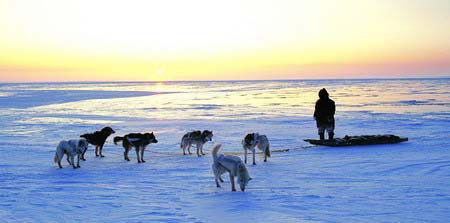兩極之間 From Pole To Pole
What would the earth be like without the sun? We'll never know, but the emperor penguins come the nearest to that experience, as they suffer through winter in Antarctica, where temperatures can drop to minus 70 degrees centigrade. Meanwhile, the sun brightens the far north and the polar bears come out of hibernation. Spring in northern Canada means the migration of three million caribou across the arctic tundra. Winter in the deciduous forests of eastern Russia makes hunting difficult for the Amur leopard, the rarest cat in the world. On the island of New Guinea, birds have plenty of food, giving them time for elaborate mating rituals. "The sun influences life in the oceans just as it does on land," explains the narrator. We watch where the seals go to breed -- and we see the Great White sharks that follow them. What would the Earth be like without water? "Planet Earth" shows us where water is abundant and where it is scarce. During the dry season in the Kalahari desert, elephants go on an urgent search for water, which they find in Okavango. "The water brings a season of plenty for all animals." And that includes the wild dogs hunting impala. "Planet Earth" offers rare footage of the hunt; and in an afterword, we find how they got it.
我們永遠不會知道,若沒有太陽,地球將會如何?南極的帝企鵝卻要在零下70攝氏度的低溫中,度過漫漫6個月的冬天。而此時此刻,地球另一端的北極,新生的北極熊寶寶從冬眠的洞穴中鉆出了腦袋。春天的到來帶來了加拿大北部三百萬頭馴鹿的大遷徙。俄羅斯東部森林依舊白雪皚皚,珍稀的阿穆爾豹蹤跡難覓。新幾內亞小島上,衣食無憂的天堂鳥華麗地展示羽毛,跳一出驚艷無比的求偶舞蹈。陽光不僅影響著陸地上的,也影響著大海中的生死存亡。海豹集中前去繁殖,引來大白鯊尾隨而至,上演令人屏息靜氣的海上捕殺。除了陽光,還有水。大象徒步踏過喀拉哈里沙漠的旱季,最終到達洪水灌溉的奧卡萬戈三角洲,一季澤國帶來了物種的多樣化,鬣狗高效地圍追堵截羚羊。四季輪回,光陰不止。南極洲的帝企鵝,引來了六個月以來的第一縷陽光。












